|
| |
Paripahi Ganadhipa |
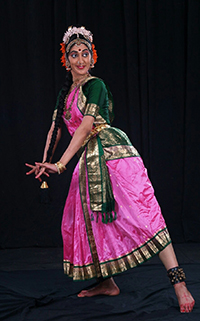 |
Dancer: Dr. Yamini Saripalli
Ragam: Saveri
Talam: Adi
Composer: Sri Swati Tirunal Maharaja
Choreography: Sri Vempati Ravi Shankar
As the son of Lord Siva and Goddess Parvati, and as Murugan’s brother, Lord Ganesha has several epithets including Vigneswara , the remover of obstacles, Ganapati, the ruler of groups and Gajanana, one with an elephant face. Lord Ganesha grants his devotees with knowledge, prosperity, and happiness and his lovable disposition and generosity towards his devotees makes him one of the most worshipped and loved Hindu deities. One of several metaphors in this composition likens this widespread worship to a swarm of bees hovering over sweet nectar. Lord Ganesha’s glory is sung by Bramha and other celestials and he is the sole refuge of those who surrender at his feet. |
|
Gati Pravah |
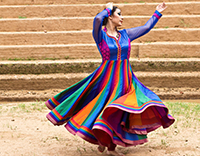 |
Dancer: Sanjukta Sinha
http://www.sanjuktasinha.com
Gati Pravah means 'the flow of speed’ and ‘Dhrut Laya’ means the fastest tempo. This dance has dynamic movements and the dancer executes ‘chakkars’ or pirouettes in a fast speed. The piece ends with intricate foot work where the feet are trained to produce different sounds by the control of the sole of the foot. In between the piece there will be a short abhinaya or narrative aspect of Kathak. |
|
Lady Macbeth |
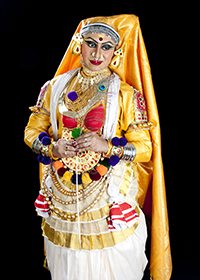 |
Dancer: Prabal Gupta
Research Guidance: Guru Sri Sadanam Balakrishnan
Lyrics: Sri Shankar Rajaram
Music composition and Vocal support: Sri Sadanam Sivadasan
Chenda and Edakkya - Sri Sadanam Ramakrishnan, Maddalam - Sri Sadanam Devadasan
Choreography: Prabal Gupta
English Narration: Prabal Gupta
Lady Macbeth, the frightening and forceful character created by Shakespeare, plotted to get King Duncan murdered, so that her husband General Macbeth could become the King of Scotland. Her evil life ends with her death while sleep walking. The fascinating role of this power hungry female will be portrayed in this Kathakali Streevesham. |
|
Krishna Nartan |
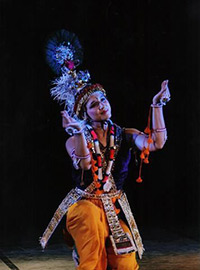 |
Dancer: Noopur Singha
Choreography: Padma Shri Guru Th. Babu Singh
This dance is excepted from Manipuri Ras Lila. In this solo, Krishna is described in all his youthful glory and beauty. Most of the full Ras Lila drama describes the early romance of Radha and Krishna flanked by all of the village Gopis. This classical style was founded in the court of King Bhagyachandra in the late 1700s, as legend has it, after he saw the Maha Ras danced in his dream. He went on to hire all the regional dancers and teachers from the pre-existing Shamanistic traditions of Manipur to codify and perfect the style, so that his dream could manifest as a yearly, night-long, dance drama. |
|
Nandi |
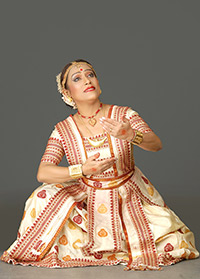 |
Dancer: Anita Sharma
Raag: Biyahgara
Taal: Pori, Sutkala & Ektaal
Music: Bhaskarjyoti Ojah
Choreography: Anita Sharma
This piece is an invocation to Lord Krishna, praising his beauty and splendor. The shlokas for this piece were taken from Ankia Naat or one-act plays written by Srimanta Sankardev, Sattriya's creator. |
|
The Meeting |
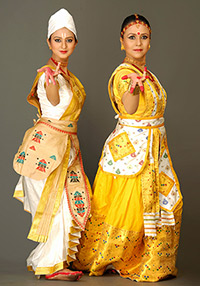 |
Company: Sattriya Dance Company, This is the only group that is being presented by both the Drive East festival and the Erasing Borders festival in NYC.
Choreography: Anita Sharma
Performers: Madhusmita Bora and Prerona Bhuyan
Music arrangement: Bhaskajyoti Ojah
This piece presents a vignette from the famous Assamese play 'Sonit Kunwori' written by one of Assam's cultural icons, Jyoti
Prasad Agarwala. Agarwala was a filmmaker, a playwright, a poet and songwriter.
Agarwala weaved the story of Sonit Kuwori at age 14. The story is a modern fairy tale romance about a beautiful princess hidden
from the world by her father and the man of her dreams. The piece showcases her first meeting with the prince. Sattriya is guided by the philosophy of 'Bhakti'.
This piece, although choreographed in pure Sattriya style, transcends barriers presenting the dance in a more secular format.
|
|
Dashavatar |
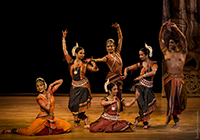 |
Company: Srishti Dances of India
http://www.srishtidances.com/main/sreyashi.jsp
Odissi Dancers: Sreyashi Dey, Kritika Rajan, Ishika Rajan
Bharatanatyam Dancers: Krithika Rajkumar, Vertika Srivastava, Sathish Mohan
Choreography: Original choreography by Guru Kelucharan Mohapatra, Adaptation for two styles and group by Sreyashi Dey
Music: Original music composition by Pandit Bhubaneswar Misra in Odissi, Adaptation to two styles by Odissi and Bharatanayam musicians.
A spiritually rousing composition, Dashavatar is based on Jayadeva’s 12th century classic – the Gita Govindam. It chronicles the ten avatars, or forms, of Vishnu, one of the Gods of the Hindu trinity. In Hindu mythology, Vishnu is the preserver of life in the universe and took ten different forms at various points time to save it from destruction and to protect and preserve balance by destroying evil. The ten avatars are Matsya (fish), Kurma (tortoise), Varaha (wild boar), Narasimha (half lion-half man), Vamana (midget), Parashurama (the slayer of Kshatriyas), Rama (the noble king), Balarama (in the form of tiller of the earth), Buddha (the messenger of peace and enlightenment) and Kalki (the destroyer of evil).
In an innovative and seamless combination of Odissi and Bharatanatyam styles, the dancers weave through the mythical stories to narrate the wondrous tales, while creating powerful motifs through dancing bodies. |
| |
|
|
|
|







